-
Table of Contents
How Did Epstein’s Wealth Influence His Legal Battles
Jeffrey Epstein, a financier and convicted sex offender, is a figure whose wealth and connections have been scrutinized in the context of his legal troubles. His financial resources not only provided him with a lavish lifestyle but also significantly influenced the legal battles he faced. This article explores how Epstein’s wealth shaped his interactions with the legal system, the outcomes of his cases, and the broader implications for justice.
The Power of Wealth in Legal Defense
Epstein’s immense wealth allowed him to hire some of the most prominent legal minds in the country. This access to top-tier legal representation is a critical factor in how wealth can influence legal outcomes. Some of the notable aspects include:
- High-Profile Attorneys: Epstein retained lawyers like Alan Dershowitz and Kenneth Starr, both of whom have extensive experience in high-stakes legal battles.
. Their expertise and connections provided Epstein with a formidable defense.
- Resources for Investigation: Wealthy defendants can afford private investigators and expert witnesses, which can significantly bolster their defense. Epstein’s team was able to gather substantial evidence and testimonies that could sway public opinion and potentially influence legal proceedings.
- Negotiation Power: With financial resources, Epstein could negotiate plea deals that less affluent defendants might not have been able to secure. His 2008 plea deal, which resulted in a mere 13-month sentence for serious charges, is a prime example of this.
The 2008 Plea Deal: A Case Study
One of the most controversial aspects of Epstein’s legal history is the plea deal he struck in 2008. This agreement, which has been widely criticized, highlights how wealth can manipulate the justice system.
- Secrecy and Favoritism: The deal was negotiated in secret and allowed Epstein to plead guilty to lesser charges of solicitation of prostitution, avoiding federal charges that could have led to a much longer sentence. This outcome raised questions about the influence of his wealth and connections.
- Impact on Victims: The deal included a non-prosecution agreement for any potential co-conspirators, effectively shielding others from accountability. Many victims felt betrayed by the system, as they were not consulted during the negotiations.
- Legal Backlash: The deal was later scrutinized, leading to a federal investigation into the conduct of the prosecutors involved. This case illustrates how Epstein’s wealth allowed him to navigate legal challenges that would have been insurmountable for most individuals.
Public Perception and Media Influence
Epstein’s wealth also played a significant role in shaping public perception and media narratives surrounding his legal battles. The following points illustrate this dynamic:
- Media Coverage: Epstein’s connections to high-profile individuals, including politicians and celebrities, garnered extensive media attention. This coverage often focused on his wealth and lifestyle, overshadowing the serious allegations against him.
- Public Sympathy: Wealth can sometimes elicit sympathy, leading to a perception that wealthy defendants are victims of circumstance rather than perpetrators. This dynamic can influence jury pools and public opinion.
- Social Media and Activism: Conversely, the rise of social media has allowed victims and activists to share their stories, challenging the narrative that wealth can shield individuals from accountability. The #MeToo movement played a crucial role in bringing attention to Epstein’s crimes.
Conclusion: The Implications of Wealth in Justice
Jeffrey Epstein’s legal battles serve as a stark reminder of how wealth can influence the justice system. His ability to secure favorable legal outcomes, negotiate lenient plea deals, and shape public perception underscores the disparities that exist within the legal framework. While Epstein’s wealth provided him with significant advantages, it also sparked a broader conversation about the need for reform in how the legal system handles cases involving affluent individuals.
As society continues to grapple with issues of justice and accountability, the Epstein case highlights the importance of ensuring that the legal system operates fairly for all, regardless of financial status. The implications of his story extend beyond his individual case, prompting a reevaluation of how wealth intersects with justice in contemporary society.
For further reading on the implications of wealth in legal battles, you can explore resources from organizations like the American Civil Liberties Union (ACLU).





